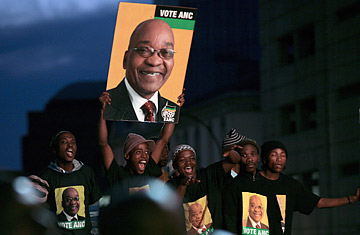
African National Congress party supporters cheer as Jacob Zuma takes the stage during a post-election celebration party in Johannesburg, South Africa.
The African National Congress and its leader Jacob Zuma will form South Africa's next government, it became clear Friday, after they ran up an unbeatable lead in the general election. Though final results are yet to be released, with 96% of districts declared from a 77% turnout, the ANC had won 66.2% of the vote. Running second, the Democratic Alliance had mustered just 16.3% nationwide, although the opposition party looked set to win back control of the Western Cape, cementing its power base in Cape Town and the surrounding province.
Although an ANC victory had been expected, its scale — indicating a similar level of support as at the last election in 2004 — has confounded predictions of a voter backlash against the ANC and Zuma, who have both courted scandal and questions over their competence. Should the ANC again finish with more than two thirds of the vote, its parliamentary majority will be large enough to amend South Africa's constitution — something opposition parties warned during the campaign that Zuma will do to his own political advantage. In response, the ANC leader this week pledged to govern "responsibly". (See pictures of South Africa 15 years after apartheid)
Sensing a landslide victory, Zuma held a rally of several thousand supporters in Johannesburg late on Thursday. "This party is an elephant," said the 67-year-old. "You cannot actually topple an elephant." Helen Zille, leader of the DA, could not hide her disappointment that the ANC's dominance would continue for another five years. "We've got to realign politics in South Africa," she said, "and that's what I'm going to spend the next five years doing."
The ANC's victory caps a remarkable personal comeback for Zuma. A Zulu patriarch who herded goats as a boy and completed just three years of school, he rose through the ranks of the ANC during apartheid. He served 10 years with Nelson Mandela on Robben Island in the 1960s and 1970s, and on his release and self-exile became the ANC's intelligence chief. In 1998, former President Thabo Mbeki made him his deputy in the party and the presidency.
But Zuma's career had appeared to be over when, in the space of a little over a year in 2005-6, he was sacked as Deputy President by Mbeki and charged in separate court cases with rape and corruption. After he was acquitted of rape in 2006, he rode a tide of internal discontent to beat Mbeki in a race for the leadership of the ANC in 2007. And just three weeks ago, state prosecutors dropped corruption charges against him, claiming the case had been irretrievably compromised by political interference under Mbeki. The election result, likely to be confirmed over the weekend, is further confirmation of Zuma's triumph over Mbeki. After Mbeki's ouster last September, his faction formed a breakaway party, the Congress of the People (Cope). But Cope was unable to settle on a leader, ran a poorly organized campaign, and on Friday was struggling to capture 7.4% of the vote. (Read a brief bio of Jacob Zuma.)
Alec Russell, author of Bring Me My Machine Gun: The Battle for the Soul of South Africa from Mandela to Zuma, said the result showed the enduring power of the ANC's historical legacy as the slayer of apartheid. "On paper you'd think the ANC would have got something of a kicking," he said. "The result shows the luster of liberation is very much undimmed. Loyalty trumps misgivings over policy failures."
Andrew Feinstein, a former ANC member of parliament who broke with the party over its attempts to block corruption investigations of senior leaders and chronicled his experience in a book titled After the Party, said that just as history took precedence over the immediate past for the party, so Zuma's reputation as a man of the people took precedence over concerns over his past conduct. "Even 51% of ANC supporters believe Zuma is guilty of corruption," said Feinstein. "But of those, 80% said they would vote for him. The message that this guy is from humble origins, this guy is you — that seems to overrule other concerns about him."
Despite the apparent decisiveness of his mandate, Zuma's intentions in office are far from clear. "We don't know what he stands for," says Russell. "He appears to be a man of no fixed opinions, a party man through and through. It is still utterly unclear how he will come to make a decision." Having presented himself as a champion of the poor, however, Zuma is under pressure to deliver. "He talked of a new era and a new chance. He has given people hope. Whether the ANC really will change its ways and deliver has to be open to question."
Observers will be looking for signs of Zuma's policy preferences in the choices he makes to staff his cabinet. Feinstein predicts the President-elect will want to reward his staunchest supporters on the ANC's left wing at the same time as maintaining an image of being business-friendly — a balancing act that will likely require a cabinet with a wide diversity of views. "The story becomes: how does Zuma manage this?" says Feinstein. "It's alright to tell people whatever they want to hear when you're campaigning, but in government you have to make hard choices. I think what we're going to see is a kind of battle for the soul of Jacob Zuma. And in that sense, the election hasn't decided that much. Everything is still up for grabs."
